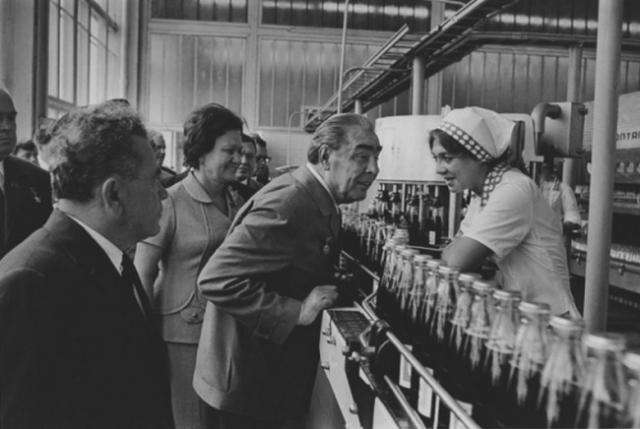In segment 25b Homo Sovieticus.
25段第二部分,苏维埃人
We encounter the homo sovieticus or new Soviet man which it was fondly believed that communism would ultimately produce.
我们所看到的苏维埃人,或是新苏联人,对他们来说,都盲目地相信共产主义终将开花结果
In fact years of deprivation and propaganda and anti-intellectualism had made the Soviet populous even too apathetic to be cynical.
事实上,多年的剥削和政治宣传以及反智主义,使得苏联人民心灰意冷,没有心情愤世嫉俗
Russian science, once the envy of all Europe,
俄国的科学一度是欧洲羡慕的对象
had been devoted to strictly military purposes for so long that the intelligentsia had basically gone into hibernation.
全部贡献给了严格的军事目的很长时间,知识分子基本上处于沉寂状态
That is to say that the lucky ones who avoided the Gulag and the psychiatric hospitals.
这就是说,有些幸运的人就躲开了古拉格劳改所和精神病院

In Segment 25c, Gerontocracy,
25段第三部分,老人政治
We trace the era of Leonid Illych Brezhnev
回想一下勃列日涅夫统治时期
a man whose bluff, pleasant personality, disguised a tiny alcohol sodden brain a perfect non-entity,
他粗豪坦率,亲切和蔼的个性,他那狭隘愚笨的头脑,他是一个彻底的无足轻重的人
he did what he could to let the Soviet Union slip down in to a mess of apathetic despair.
他所做的一切,都让苏联滑入了一团糟和绝望中
Brezhnev was not as some believe old and senile, he was merely in his late 50's when Khrushchev was deposed in 1964.
勃列日涅夫不像有些人认为的那样是个年老体衰,在赫鲁晓夫1964年被撤职时他当时还不到60岁
Brezhnev's handling of the Czechoslovakian Prague spring of 1968 was vigorous
勃列日涅夫处理1968年捷克斯洛伐克的布拉格之春很是强硬
but eventually he came to exemplify the notion of Gerontocracy, rule, and this is the definition, rule by extremely old men.
但最终他开始用自己的行为说明老年政治的概念、规则,这儿有个定义,由非常年老的人进行统治












